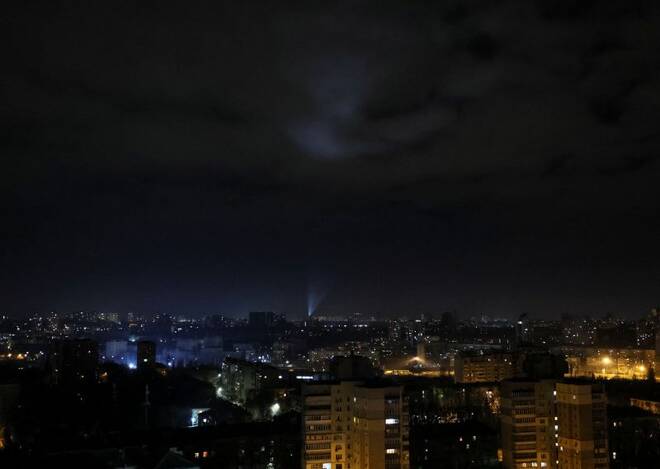Advertisement
Advertisement
Anger in Russia as scores of troops killed in one of Ukraine war’s deadliest strikes
By:
By Pavel Polityuk and Herbert Villarraga
By Pavel Polityuk
KYIV (Reuters) – Russia acknowledged on Monday that scores of its troops were killed in one of the Ukraine war’s deadliest strikes, drawing demands from Russian nationalist bloggers for commanders to be punished for housing soldiers alongside an ammunition dump.
Russia’s defence ministry said 63 soldiers had died in the fiery blast which destroyed a temporary barracks in a former vocational college in Makiivka, twin city of the Russian-occupied regional capital of Donetsk in eastern Ukraine.
It said the accommodation had been hit by four rockets fired from U.S.-made HIMARS launchers, claiming two rockets had been shot down. Kyiv said the Russian death toll was in the hundreds, though pro-Russian officials called this an exaggeration.
Russian military bloggers said the huge destruction was a result of storing ammunition in the same building as a barracks, despite commanders knowing it was within range of Ukrainian rockets.
Separately, Ukraine said on Monday it had shot down all 39 drones Russia had fired in a third straight night of air strikes against civilian targets in Kyiv and other cities.
Ukrainian officials said their success proved that Russia’s tactic in recent months of raining down air strikes to knock out Ukraine’s energy infrastructure was increasingly a failure as Kyiv beefs up its air defences.
‘EACH MISTAKE HAS A NAME’
Unverified footage posted online of the aftermath of the strike on the Russian barracks in Makiivka showed a huge building reduced to smoking rubble.
Igor Girkin, a former commander of pro-Russian troops in eastern Ukraine who is now one of the highest profile Russian nationalist military bloggers, said hundreds and been killed or wounded in the blast. Ammunition had been stored at the site and military equipment there was uncamouflaged, he said.
Another nationalist blogger, Rybar, said around 70 soldiers were confirmed dead and more than 100 wounded.
“What happened in Makiivka is horrible,” wrote Archangel Spetznaz Z, another Russian military blogger with more than 700,000 followers on Telegram.
“Who came up with the idea to place personnel in large numbers in one building, where even a fool understands that even if they hit with artillery, there will be many wounded or dead?” he wrote. Commanders “couldn’t care less” about ammunition stored in disarray on the battlefield, he said.
The open fury extended to lawmakers.
Grigory Karasin, a member of the Russian Senate and former deputy foreign minister, not only demanded vengeance against Ukraine and its NATO supporters but also “an exacting internal analysis”.
Sergei Mironov, a legislator and former chairman of the Senate, Russia’s upper house, demanded criminal liability for the officials who had “allowed the concentration of military personnel in an unprotected building” and “all the higher authorities who did not provide the proper level of security”.
“Obviously neither intelligence nor counterintelligence nor air defence worked properly,” he said in a post on Telegram.
Russia’s acknowledgement of scores of deaths in one incident was almost without precedent. Moscow rarely releases figures for its casualties, and when it does the figures are typically low – it acknowledged just one death from among a crew of hundreds when Ukraine sank its flagship cruiser Moskva in April.
Russia has seen in the new year with nightly attacks on Ukrainian cities, including Kyiv, hundreds of kilometres from the front lines. This marks a change in tactics after months in which Moscow usually spaced such strikes around a week apart.
After firing dozens of missiles on Dec. 31, Russia launched dozens of Iranian-made Shahed drones on Jan. 1 and Jan. 2. But Kyiv said on Monday it had shot down all 39 drones in the latest wave, including 22 downed over the capital.
Kyiv said the new tactic was a sign of Russia’s desperation as Ukraine’s ability to defend its air space had improved.
“Now they are looking for routes and attempts to hit us somehow, but their terror tactics will not work. Our sky will turn into a shield,” presidential chief of staff Andriy Yermak said on Telegram.
In his nightly speech, President Volodymyr Zelenskiy said Russia’s efforts would prove useless. “Drones, missiles, everything else will not help them,” he said of the Russians. “Because we stand united. They are united only by fear.”
Ukraine’s air defence systems worked through the night to bring down incoming drones and to warn communities of the approaching danger.
Russia has turned to mass air strikes against Ukrainian cities since suffering defeats on the battlefield in the second half of 2022.
It says its attacks, which have knocked out heat and power to millions in winter, aim to reduce Kyiv’s ability to fight. Ukraine says the attacks have no military purpose and are intended to hurt civilians, a war crime.
Russia has flattened Ukrainian cities, killed thousands of civilians and annexed swathes of Ukraine since Putin ordered his invasion last February, calling Ukraine an artificial state whose pro-Western outlook threatened Russia’s security.
Ukraine has fought back with Western military support, driving Russian forces from more than half the territory they seized. In recent weeks, the front lines have been largely static, with thousands of soldiers dying in intense warfare.
(Reporting by Reuters bureaux; Writing by Peter Graff, Lidia Kelly, Dan Peleschuk and Michael Perry; Editing by Clarence Fernandez, Robert Birsel, Alexandra Hudson and Mark Heinrich)
About the Author
Reuterscontributor
Reuters, the news and media division of Thomson Reuters, is the world’s largest international multimedia news provider reaching more than one billion people every day. Reuters provides trusted business, financial, national, and international news to professionals via Thomson Reuters desktops, the world's media organizations, and directly to consumers at Reuters.com and via Reuters TV. Learn more about Thomson Reuters products:
Did you find this article useful?
Latest news and analysis
Advertisement
